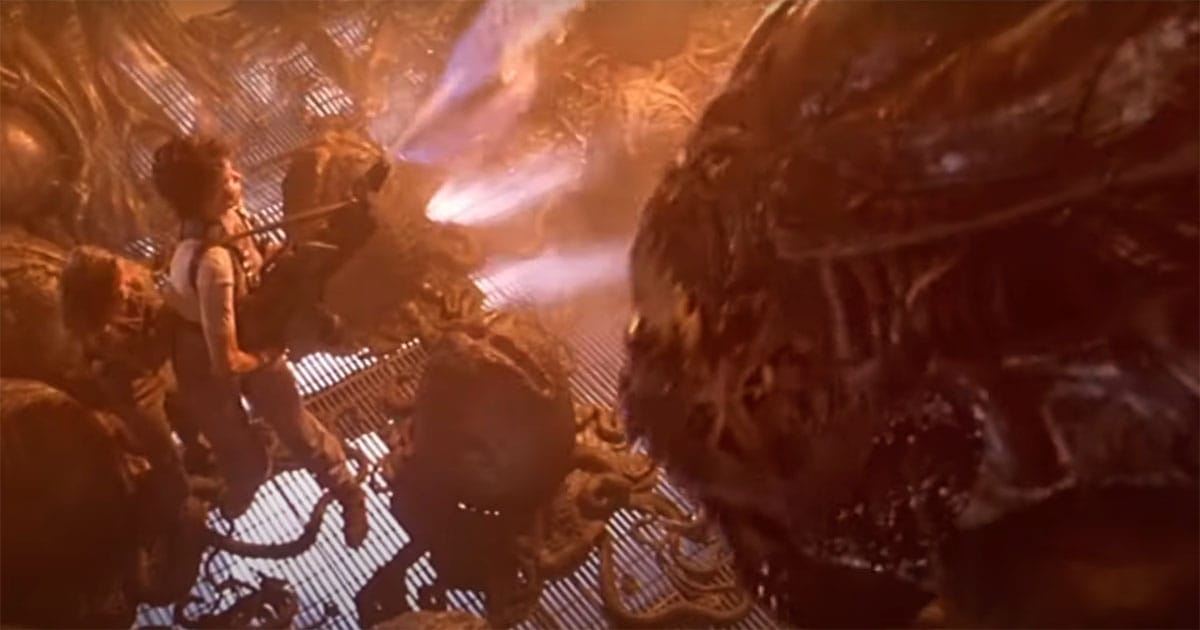Aliens and the Art of Tactical Science Fiction
“Aliens” (1986), directed by James Cameron, delivers thrilling action and deep themes, earning a rating of 8.4/10 in classic science fiction cinema.

"Aliens," directed by James Cameron and released in 1986, serves as a dynamic sequel to Ridley Scott's 1979 classic, "Alien." The film reunites audiences with Ellen Ripley, portrayed with strength and nuance by Sigourney Weaver, who returns to confront the formidable xenomorphs alongside a team of Colonial Marines led by Corporal Dwayne Hicks, played by Michael Biehn. With a screenplay also penned by Cameron, "Aliens" shifts away from the atmospheric horror of its predecessor, embracing a high-octane action-thriller format while maintaining the psychological tension that initially captivated audiences.
Cameron significantly expands the universe, exploring themes of motherhood and corporate greed while introducing a compelling maternal dynamic between Ripley and the young survivor Newt, played by Carrie Henn. The film heightens the stakes by antagonizing Ripley with not one but an entire hive of aliens, culminating in the introduction of the chilling Queen Xenomorph. While some elements reflect the filmmaking techniques of the mid-1980s, the film remains a masterclass in action direction, showcasing tightly crafted sequences that keep viewers on the edge of their seats. Overall, "Aliens" not only builds on the original's legacy but also establishes an iconic place in the action and science fiction genres.
| Attribute | Details |
|---|---|
| Title | Aliens |
| Director | James Cameron |
| Writer | James Cameron, David Giler, Walter Hill |
| Actors or Actresses | Sigourney Weaver, Michael Biehn, Carrie Henn |
| Rated | R |
| Runtime | 137 min |
| Box Office | $85,160,248 |
| U.S. Release Date | 18 Jul 1986 |
| Quality Score | 8.4/10 |
Synopsis
In "Aliens," the human ambition to colonize distant worlds leads to unforeseen peril on the planet LV-426. Decades after a commercial spacecraft first encountered a deadly lifeform there, a terraforming colony goes dark. The authorities, dismissing caution in favor of corporate interests, dispatch a team of Colonial Marines to investigate. Among them is Ripley, the only survivor of the earlier incident, brought along for her knowledge of the creature.

The mission proceeds with military confidence but rapidly descends into confusion. The marines, well-armed but unprepared for the nature of the enemy, find the colony in ruins and the settlers either missing or dead. What they uncover is not merely a rogue organism but an entrenched alien species operating with biological efficiency and hive intelligence. The xenomorphs are not only lethal but organized, defending their nest with animal ferocity and calculated menace.
As the squad is whittled down, the threat escalates. The discovery of an alien queen shifts the narrative from survival to containment. Sacrifices are made, machinery is repurposed, and tactics are revised under pressure. In the end, the confrontation with the queen is not a mere clash of individuals but a conflict between species — one driven by instinct, the other by ingenuity.
"Aliens" is a study in the limits of human control and the arrogance of underestimating the unknown. It is a hard science fiction tale wrapped in military garb, emphasizing tactical error, biological horror, and the fragile edge upon which civilization balances when confronted with the truly alien.
Themes
"Aliens" unites explosive action with grounded thematic depth, making it one of the most accomplished entries in science fiction cinema. At its core, the film explores the clash between human technology and alien biology, between institutional overconfidence and primal survival. The xenomorphs are more than predators. They represent a perfectly evolved threat, indifferent to reason, immune to negotiation, and lethal in execution.
Ripley returns not as a mere survivor but as the only person with firsthand knowledge of the danger. Her warnings are dismissed until it is too late, showing the failure of bureaucracies that value procedure over prudence. Once the threat becomes undeniable, Ripley does not wait for orders. She adapts, plans, and acts. Her choices are grounded in experience and necessity. She does not pursue heroism. She delivers it through calm judgment and quick decisions. Her protective role toward Newt feels earned and unforced. It adds dimension to her character without softening the story's harsh edge.

Corporate negligence is made visible through Burke, a figure of polite ambition masking ruthless intent. His willingness to sacrifice others for financial gain highlights a deeper danger. The real threat often comes not from the alien but from the human systems that refuse to recognize peril until it becomes irreversible. The film presents this truth with clarity, not commentary, making it all the more effective.
Visually, the colony on LV-426 is cold and industrial, a functional structure unprepared for a biological siege. Its corridors feel abandoned and tense. The alien hive offers a natural contrast, dense and humid, pulsing with menace. Together, these environments create a pressure cooker for conflict. Technology and instinct are placed on equal footing. Neither guarantees survival.
The sound design deepens the tension. James Horner's score accelerates the pace without drowning it in noise. Every sound serves a purpose. The echo of movement, the pulse of machinery, the shriek of an unseen threat — each moment is sharpened by the mix of silence and violence. When Ripley arms herself and descends into the hive, the sound tightens. The film enters a final stretch where sound and image become a single force driving toward resolution.
"Aliens" delivers more than spectacle. It offers a measured warning about arrogance, an acknowledgment of courage, and a reminder that real strength lies in action taken when failure is not an option. Through Ripley, through the Marines, and through every hard decision made in darkness, the film speaks with precision and power.
Who Will Enjoy Aliens
"Aliens" offers something of value to a wide range of viewers, including those who do not typically gravitate toward science fiction. It delivers both action and substance, making it a fitting choice for anyone who values intelligent storytelling anchored in high-stakes conflict. The film's pacing, tension, and sharp execution appeal to audiences who want more than spectacle. They want precision. They want consequence.
Viewers with an appreciation for character-driven narratives will find Ripley's evolution compelling. Her arc is not about sentiment. It is about responsibility earned through experience. Her choices are grounded in survival, not symbolism. Those who value integrity, leadership, and practical courage will recognize her importance in the film's structure.

The critique of corporate ambition adds another layer of interest. The story warns against unchecked business motives and explores what happens when profit is placed above principle. These elements will resonate with viewers who enjoy films that reveal deeper truths without needing to moralize. A double feature with other science fiction films that address corporate overreach could provide a rewarding and thoughtful evening.
For those who enjoy military drama and tightly choreographed action, "Aliens" delivers on every front. It brings the discipline of a war film into the framework of science fiction, pairing advanced weapons and tactics with the chaos of an unpredictable enemy. The tension is constant, and the resolution is earned. This makes it an excellent selection for group viewings where energy and momentum are key.
Cinematography, set design, and sound are executed with discipline and impact. Anyone who studies filmmaking or writes fiction will find much to examine here. The film does not rely on tricks or trends. It builds its world with clear vision and delivers its message without compromise. From camera angles to lighting to the sonic undercurrent that drives each scene, every detail serves a purpose.
"Aliens" continues to hold relevance not through nostalgia but through craftsmanship. It respects its audience, engages with difficult themes, and never forgets to entertain. Whether one comes to it for adrenaline or analysis, the film rewards attention. It remains not only a landmark of the genre but a benchmark for what science fiction can achieve when handled with skill and intent.

